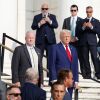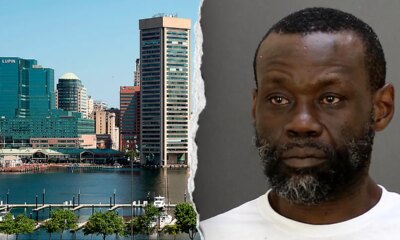News
Army says Arlington National Cemetery worker was 'pushed aside' by Trump aides

Graves with flags for Memorial Day are seen in Section 60 of Arlington National Cemetery, in Arlington, Va., on May 27.
Jacquelyn Martin/AP
hide caption
toggle caption
Jacquelyn Martin/AP
The U.S. Army said an employee at Arlington National Cemetery who tried to “ensure adherence” to rules that prohibit political activities at the cemetery “was abruptly pushed aside,” but that the employee decided not to press charges against the Trump campaign staffers who allegedly pushed her.
The statement Thursday comes in response to NPR’s reporting on former President Donald Trump’s visit to Arlington and an altercation his staff had with a cemetery employee.
“Participants in the August 26th ceremony and the subsequent Section 60 visit were made aware of federal laws, Army regulations and DoD policies, which clearly prohibit political activities on cemetery grounds,” the statement said. “An ANC employee who attempted to ensure adherence to these rules was abruptly pushed aside. Consistent with the decorum expected at ANC, this employee acted with professionalism and avoided further disruption. The incident was reported to the JBM-HH police department, but the employee subsequently decided not to press charges. Therefore, the Army considers this matter closed.”
The Army, in its statement, called the incident “unfortunate,” adding: “it is also unfortunate that the ANC employee and her professionalism has been unfairly attacked.”
Because federal law prohibits Army employees from being involved with any political campaign, the staff at the cemetery did not deal directly with the Trump campaign about his visit there. A source familiar with the event said the cemetery staff worked with the staff of Republican Congressman Brian Mast of Florida, who joined Trump at Arlington.
Arlington Cemetery staff dealt directly with Mast’s chief of staff, James Langenderfer, briefing him extensively on the rules, which include no campaign events at the cemetery. They also reiterated that only an official Arlington National Cemetery photographer — and no campaign photographer — could be used at Section 60, the location of the recent American war dead. The source said Langenderfer told them the Trump campaign agreed to these rules.
NPR reached out to Mast’s staff and asked if Langenderfer was briefed and relayed that information to the Trump campaign. They did not address the questions but instead released a statement.
In the statement to NPR, Mast said: “President Trump conducted no politics at Arlington National Cemetery.”
The statement comes a day after Trump shared a TikTok video including footage from Arlington National Cemetery that likely violates a federal law against using military cemeteries for campaigning purposes.
NPR reported that Trump campaign staffers had a physical altercation with an Arlington National Cemetery staffer on Monday over the restriction.
It’s not the first time Trump has been accused of politicizing the military, but the campaign is seeking to downplay what happened in the aftermath.

Trump was at Arlington on Monday to commemorate the third anniversary of an attack in Afghanistan that killed 13 U.S. service members amid the disastrous withdrawal of troops. Trump and other Republicans have blamed President Biden and Vice President Harris for the chaos and loss of life.
The 21-second video posted on Trump’s TikTok account shows the former president laying a wreath at the Tomb of the Unknown Soldier and several snippets of Trump joining Gold Star family members at gravesites of their loved ones in a part of the cemetery known as Section 60.
“We lost 13 great, great people — what a horrible day it was,” Trump says over somber music. “We didn’t lose one person in 18 months, and then they took over the disaster, the leaving of Afghanistan.”
Trump has been making this claim about 18 months without military casualties during his administration for years, and it’s not true. The 18-month period from February 2020 to August 2021 saw no combat-related deaths in Afghanistan, with part of that when Biden was in office.
The Trump campaign was not authorized to film or photograph in Section 60, federal law prohibits the use of military cemeteries for campaign events, and two campaign staffers got in a physical and verbal altercation with the Arlington staffer who tried to prevent the filming.
In a statement after NPR’s original story, family members present Monday said they invited Trump and gave approval for his photographer and videographer to document an emotional moment of remembrance.

Some of those family members also spoke at the Republican National Convention, bashing Biden and vocally endorsing Trump.
“Joe Biden may have forgotten that our children died, but we have not forgotten — Donald Trump has not forgotten,” said Cheryl Juels in Milwaukee at the RNC in July. Juels is the aunt of Sgt. Nicole Gee, one of the 13 U.S. service members killed at Abbey Gate in Afghanistan in 2021.
“Joe Biden owes the men and women that served in Afghanistan a debt of gratitude and an apology. Donald Trump loves this country and will never forget the sacrifice and bravery of our service members,” she added. “Join us in putting him back in the White House.”
Though the loved ones said they were OK with the cameras present, the families do not have the power to suspend the rules.
The family of Master Sgt. Andrew Marckesano, a Green Beret who died by suicide after serving multiple combat tours and who is buried in Section 60, said according to their conversations with the cemetery, “the Trump campaign staffers did not adhere to the rules that were set in place for this visit.”
“We hope that those visiting this sacred site understand that there were real people who sacrificed for our freedom and that they are honored and respected and treated accordingly,” they said in a statement.
The Trump campaign responds
In the aftermath of the visit to Arlington, the Trump campaign’s response has taken on a tone of nastiness. One spokesman said the cemetery staffer was “clearly suffering from a mental health episode” and promised to release footage of the encounter but has so far declined to do so.
On the campaign trail in Pennsylvania on Wednesday, the Republican vice presidential nominee, Sen. JD Vance of Ohio, said Harris could “go to hell” over the Afghanistan withdrawal and blamed reporters for the campaign’s controversy, which he called a “disagreement.”
“You guys in the media, you’re acting like Donald Trump filmed a TV commercial at a grave site,” Vance said. “He was there providing emotional support to a lot of brave Americans who lost loved ones they never should have lost. And there happened to be a camera there, and somebody gave him permission to have that camera there.”
Trump echoed that argument Thursday, doubling down on attacks against Harris and Biden in a clip posted to his campaign’s Trump Social account from a campaign event in Michigan.
“She does not respect you, ask the families of the 13 incredible servicemember heroes who died during the surrender of Afghanistan — which was surrendered by Kamala and ‘Sleepy Joe’ — whether or not Kamala Harris cares about our young people and our military,” Trump said.
Meanwhile, Utah Gov. Spencer Cox, who attended the Arlington events with Trump, apologized in a social media post for sending a campaign fundraising email with a photo of him and the former president in Section 60 with the family of Staff Sgt. Darin Taylor Hoover.
Cox’s official gubernatorial X account posted a photo from the restricted area, and the post is still online.
This is not the first time Trump has been accused of politicizing the military for his personal gain. He has allegedly called dead soldiers “suckers” and “losers,” insulted the late Sen. John McCain for being a prisoner of war and recently stoked controversy for saying civilian Presidential Medal of Freedom recipients are much better than those who received the Medal of Honor — the highest military award in the country, often given posthumously.

News
Map: Earthquake Shakes Central California
Note: Map shows the area with a shake intensity of 3 or greater, which U.S.G.S. defines as “weak,” though the earthquake may be felt outside the areas shown. The New York Times
A minor earthquake with a preliminary magnitude of 3.5 struck in Central California on Monday, according to the United States Geological Survey.
The temblor happened at 7:17 a.m. Pacific time about 6 miles northwest of Pinnacles, Calif., data from the agency shows.
As seismologists review available data, they may revise the earthquake’s reported magnitude. Additional information collected about the earthquake may also prompt U.S.G.S. scientists to update the shake-severity map.
Source: United States Geological Survey | Notes: Shaking categories are based on the Modified Mercalli Intensity scale. When aftershock data is available, the corresponding maps and charts include earthquakes within 100 miles and seven days of the initial quake. All times above are Pacific time. Shake data is as of Monday, March 2 at 10:20 a.m. Eastern. Aftershocks data is as of Monday, March 2 at 11:18 a.m. Eastern.
News
US says Kuwait accidentally shot down 3 American jets

The U.S. and Israel have been conducting strikes against targets in Iran since Saturday morning, with the aim of toppling Tehran’s clerical regime. Iran has fired back, with retaliatory assaults featuring missiles and drones targeting several Gulf countries and American bases in the Middle East.
“All six aircrew ejected safely, have been safely recovered, and are in stable condition. Kuwait has acknowledged this incident, and we are grateful for the efforts of the Kuwaiti defense forces and their support in this ongoing operation,” Central Command said.
“The cause of the incident is under investigation. Additional information will be released as it becomes available,” it added.
In a separate statement later Monday, Central Command said that American forces had been killed during combat since the strikes began.
“As of 7:30 am ET, March 2, four U.S. service members have been killed in action. The fourth service member, who was seriously wounded during Iran’s initial attacks, eventually succumbed to their injuries,” it said.
Major combat operations continue and our response effort is ongoing. The identities of the fallen are being withheld until 24 hours after next of kin notification,” Central Command added.
This story has been updated.
News
Satellite images provide view inside Iran at war

Smoke rises over Konarak naval base in southern Iran on Sunday. The base was one of hundreds of targets of U.S. and Israeli forces throughout the country.
Planet Labs PBC
hide caption
toggle caption
Planet Labs PBC
Commercial satellite images are providing a unique look at the extent of damage being done to Iran’s military facilities across the country.
The U.S. and Israeli military campaign opened with a daytime attack that struck Iranian leadership in central Tehran. Smoke was still visible rising from Ayatollah Ali Khamenei’s compound following the attack that killed the supreme leader.

An image by the company Airbus taken on Saturday shows the aftermath of an Israeli strike on Iran’s Leadership House in central Tehran. Iran’s Supreme Leader Ayatollah Ali Khamenei was killed in the opening wave of attacks.
Pléiades Neo (c) Airbus DS 2026
hide caption
toggle caption
Pléiades Neo (c) Airbus DS 2026
Israel and the U.S. have gone on to strike targets across the country. Reports on social media indicate that there have been numerous military bases and compounds attacked all over Iran, and Iran has responded with attacks throughout the Middle East.
U.S. forces have also been striking at Iran’s navy. In a post on his social media platform, President Trump said that he had been briefed that U.S. forces had sunk nine Iranian naval vessels. U.S. Central Command did not immediately confirm that number but it did say it had struck an Iranian warship in port.

An image captured on Saturday shows a ship burning at Iran’s naval base at Konarak.
Satellite image ©2026 Vantor
hide caption
toggle caption
Satellite image ©2026 Vantor
Numerous satellite images show burning vessels at Konarak naval base in southern Iran. Images also show damage to a nearby airbase where hardened hangers were struck by precision munitions.

Hardened aircraft shelters at Konarak airbase were struck with precision munitions.
Satellite image ©2026 Vantor
hide caption
toggle caption
Satellite image ©2026 Vantor
And there was extensive damage at a drone base in the same area. Iran has launched numerous drones and missiles toward Israel and U.S. military installations in Bahrain, Kuwait and Qatar. Many drones have been intercepted but videos on social media show that some have evaded air defenses and caused damage in nearby Gulf countries. In Dubai, debris from an Iranian drone damaged the iconic Burj Al Arab, according to a statement from Dubai’s government.

Buildings at an Iranian drone base at Konarak were destroyed in the strikes.
Satellite image ©2026 Vantor
hide caption
toggle caption
Satellite image ©2026 Vantor
Iran’s most powerful weapons are its long-range missiles. The Iranian Revolutionary Guards have hidden the missiles deep inside mountain tunnels. Images taken Sunday in the mountains of northern Iran indicate that some of those tunnels were hit in a wave of strikes.
Following Khamenei’s death, Iran declared 40 days of mourning. Satellite images showed mourners gathering in Tehran’s Enghelab square on Sunday.
Iranian Foreign Ministry Spokesperson Esmail Baghaei told NPR on Sunday that Iran will continue to fight “foreign aggression, foreign domination.”
A White House official told NPR that Trump plans to talk to Iran’s interim leadership “eventually,” but that for now, U.S. operations continue in the region “unabated.”

A large crowd of mourners fill Enghelab Square in Tehran on Sunday, following the death of Iran’s Supreme Leader Ayatollah Ali Khamenei, who was killed in an Israeli airstrike.
Satellite image ©2026 Vantor
hide caption
toggle caption
Satellite image ©2026 Vantor
-

 World5 days ago
World5 days agoExclusive: DeepSeek withholds latest AI model from US chipmakers including Nvidia, sources say
-

 Massachusetts5 days ago
Massachusetts5 days agoMother and daughter injured in Taunton house explosion
-

 Denver, CO5 days ago
Denver, CO5 days ago10 acres charred, 5 injured in Thornton grass fire, evacuation orders lifted
-

 Louisiana1 week ago
Louisiana1 week agoWildfire near Gum Swamp Road in Livingston Parish now under control; more than 200 acres burned
-

 Technology1 week ago
Technology1 week agoYouTube TV billing scam emails are hitting inboxes
-

 Politics1 week ago
Politics1 week agoOpenAI didn’t contact police despite employees flagging mass shooter’s concerning chatbot interactions: REPORT
-

 Technology1 week ago
Technology1 week agoStellantis is in a crisis of its own making
-

 News1 week ago
News1 week agoWorld reacts as US top court limits Trump’s tariff powers



















